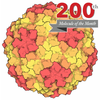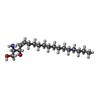[English] 日本語
 Yorodumi
Yorodumi- PDB-6lht: Localized reconstruction of coxsackievirus A16 mature virion in c... -
+ Open data
Open data
- Basic information
Basic information
| Entry | Database: PDB / ID: 6lht | |||||||||||||||||||||||||||||||||
|---|---|---|---|---|---|---|---|---|---|---|---|---|---|---|---|---|---|---|---|---|---|---|---|---|---|---|---|---|---|---|---|---|---|---|
| Title | Localized reconstruction of coxsackievirus A16 mature virion in complex with Fab 18A7 | |||||||||||||||||||||||||||||||||
 Components Components |
| |||||||||||||||||||||||||||||||||
 Keywords Keywords | VIRAL PROTEIN / localized reconstruction | |||||||||||||||||||||||||||||||||
| Function / homology |  Function and homology information Function and homology informationsymbiont-mediated suppression of host cytoplasmic pattern recognition receptor signaling pathway via inhibition of MDA-5 activity / picornain 2A / symbiont-mediated suppression of host mRNA export from nucleus / symbiont genome entry into host cell via pore formation in plasma membrane / picornain 3C / T=pseudo3 icosahedral viral capsid / host cell cytoplasmic vesicle membrane / viral capsid / nucleoside-triphosphate phosphatase / channel activity ...symbiont-mediated suppression of host cytoplasmic pattern recognition receptor signaling pathway via inhibition of MDA-5 activity / picornain 2A / symbiont-mediated suppression of host mRNA export from nucleus / symbiont genome entry into host cell via pore formation in plasma membrane / picornain 3C / T=pseudo3 icosahedral viral capsid / host cell cytoplasmic vesicle membrane / viral capsid / nucleoside-triphosphate phosphatase / channel activity / monoatomic ion transmembrane transport / symbiont-mediated suppression of host NF-kappaB cascade / host cell cytoplasm / DNA replication / RNA helicase activity / endocytosis involved in viral entry into host cell / symbiont-mediated suppression of host gene expression / symbiont-mediated activation of host autophagy / RNA-directed RNA polymerase / cysteine-type endopeptidase activity / viral RNA genome replication / RNA-directed RNA polymerase activity / DNA-templated transcription / virion attachment to host cell / host cell nucleus / structural molecule activity / ATP hydrolysis activity / proteolysis / RNA binding / zinc ion binding / ATP binding / membrane Similarity search - Function | |||||||||||||||||||||||||||||||||
| Biological species |    Coxsackievirus A16 Coxsackievirus A16 | |||||||||||||||||||||||||||||||||
| Method | ELECTRON MICROSCOPY / single particle reconstruction / cryo EM / Resolution: 3.67 Å | |||||||||||||||||||||||||||||||||
 Authors Authors | He, M.Z. / Xu, L.F. / Zheng, Q.B. / Zhu, R. / Yin, Z.C. / Cheng, T. / Li, S.W. | |||||||||||||||||||||||||||||||||
| Funding support |  China, China,  United States, 9items United States, 9items
| |||||||||||||||||||||||||||||||||
 Citation Citation |  Journal: Cell Host Microbe / Year: 2020 Journal: Cell Host Microbe / Year: 2020Title: Identification of Antibodies with Non-overlapping Neutralization Sites that Target Coxsackievirus A16. Authors: Maozhou He / Longfa Xu / Qingbing Zheng / Rui Zhu / Zhichao Yin / Zhenghui Zha / Yu Lin / Lisheng Yang / Yang Huang / Xiangzhong Ye / Shuxuan Li / Wangheng Hou / Yangtao Wu / Jinle Han / ...Authors: Maozhou He / Longfa Xu / Qingbing Zheng / Rui Zhu / Zhichao Yin / Zhenghui Zha / Yu Lin / Lisheng Yang / Yang Huang / Xiangzhong Ye / Shuxuan Li / Wangheng Hou / Yangtao Wu / Jinle Han / Dongxiao Liu / Zekai Li / Zhenqin Chen / Hai Yu / Yuqiong Que / Yingbin Wang / Xiaodong Yan / Jun Zhang / Ying Gu / Z Hong Zhou / Tong Cheng / Shaowei Li / Ningshao Xia /   Abstract: Hand, foot, and mouth disease is a common childhood illness primarily caused by coxsackievirus A16 (CVA16), for which there are no current vaccines or treatments. We identify three CVA16-specific ...Hand, foot, and mouth disease is a common childhood illness primarily caused by coxsackievirus A16 (CVA16), for which there are no current vaccines or treatments. We identify three CVA16-specific neutralizing monoclonal antibodies (nAbs) with therapeutic potential: 18A7, 14B10, and NA9D7. We present atomic structures of these nAbs bound to all three viral particle forms-the mature virion, A-particle, and empty particle-and show that each Fab can simultaneously occupy the mature virion. Additionally, 14B10 or NA9D7 provide 100% protection against lethal CVA16 infection in a neonatal mouse model. 18A7 binds to a non-conserved epitope present in all three particles, whereas 14B10 and NA9D7 recognize broad protective epitopes but only bind the mature virion. NA9D7 targets an immunodominant site, which may overlap the receptor-binding site. These findings indicate that CVA16 vaccines should be based on mature virions and that these antibodies could be used to discriminate optimal virion-based immunogens. | |||||||||||||||||||||||||||||||||
| History |
|
- Structure visualization
Structure visualization
| Movie |
 Movie viewer Movie viewer |
|---|---|
| Structure viewer | Molecule:  Molmil Molmil Jmol/JSmol Jmol/JSmol |
- Downloads & links
Downloads & links
- Download
Download
| PDBx/mmCIF format |  6lht.cif.gz 6lht.cif.gz | 245.9 KB | Display |  PDBx/mmCIF format PDBx/mmCIF format |
|---|---|---|---|---|
| PDB format |  pdb6lht.ent.gz pdb6lht.ent.gz | 197 KB | Display |  PDB format PDB format |
| PDBx/mmJSON format |  6lht.json.gz 6lht.json.gz | Tree view |  PDBx/mmJSON format PDBx/mmJSON format | |
| Others |  Other downloads Other downloads |
-Validation report
| Arichive directory |  https://data.pdbj.org/pub/pdb/validation_reports/lh/6lht https://data.pdbj.org/pub/pdb/validation_reports/lh/6lht ftp://data.pdbj.org/pub/pdb/validation_reports/lh/6lht ftp://data.pdbj.org/pub/pdb/validation_reports/lh/6lht | HTTPS FTP |
|---|
-Related structure data
| Related structure data |  0897MC  0887C  0888C  0889C  0890C  0891C  0892C  0894C  0895C  0898C  6lhaC 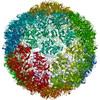 6lhbC  6lhcC  6lhkC  6lhlC  6lhoC  6lhpC  6lhqC M: map data used to model this data C: citing same article ( |
|---|---|
| Similar structure data |
- Links
Links
- Assembly
Assembly
| Deposited unit | 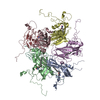
|
|---|---|
| 1 |
|
- Components
Components
| #1: Antibody | Mass: 12625.044 Da / Num. of mol.: 1 / Source method: isolated from a natural source / Source: (natural)  | ||||||
|---|---|---|---|---|---|---|---|
| #2: Antibody | Mass: 13383.772 Da / Num. of mol.: 1 / Source method: isolated from a natural source / Source: (natural)  | ||||||
| #3: Protein | Mass: 33106.352 Da / Num. of mol.: 5 / Source method: isolated from a natural source / Source: (natural)   Coxsackievirus A16 / References: UniProt: A0A2S1BJ89, UniProt: Q9QF31*PLUS Coxsackievirus A16 / References: UniProt: A0A2S1BJ89, UniProt: Q9QF31*PLUS#4: Chemical | ChemComp-SPH / Has ligand of interest | Y | Has protein modification | Y | |
-Experimental details
-Experiment
| Experiment | Method: ELECTRON MICROSCOPY |
|---|---|
| EM experiment | Aggregation state: PARTICLE / 3D reconstruction method: single particle reconstruction |
- Sample preparation
Sample preparation
| Component |
| ||||||||||||||||||||||||
|---|---|---|---|---|---|---|---|---|---|---|---|---|---|---|---|---|---|---|---|---|---|---|---|---|---|
| Source (natural) |
| ||||||||||||||||||||||||
| Details of virus | Empty: NO / Enveloped: NO / Isolate: STRAIN / Type: VIRION | ||||||||||||||||||||||||
| Buffer solution | pH: 7.4 | ||||||||||||||||||||||||
| Specimen | Embedding applied: NO / Shadowing applied: NO / Staining applied: NO / Vitrification applied: YES | ||||||||||||||||||||||||
| Vitrification | Cryogen name: ETHANE |
- Electron microscopy imaging
Electron microscopy imaging
| Experimental equipment |  Model: Titan Krios / Image courtesy: FEI Company |
|---|---|
| Microscopy | Model: FEI TITAN KRIOS |
| Electron gun | Electron source:  FIELD EMISSION GUN / Accelerating voltage: 300 kV / Illumination mode: FLOOD BEAM FIELD EMISSION GUN / Accelerating voltage: 300 kV / Illumination mode: FLOOD BEAM |
| Electron lens | Mode: BRIGHT FIELD |
| Image recording | Electron dose: 40 e/Å2 / Detector mode: SUPER-RESOLUTION / Film or detector model: GATAN K2 SUMMIT (4k x 4k) |
- Processing
Processing
| Software | Name: PHENIX / Version: 1.14_3259: / Classification: refinement |
|---|---|
| EM software | Name: PHENIX / Category: model refinement |
| CTF correction | Type: PHASE FLIPPING ONLY |
| Symmetry | Point symmetry: C1 (asymmetric) |
| 3D reconstruction | Resolution: 3.67 Å / Resolution method: FSC 0.143 CUT-OFF / Num. of particles: 57409 / Symmetry type: POINT |
 Movie
Movie Controller
Controller


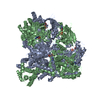
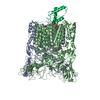
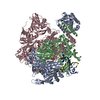
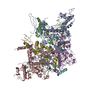
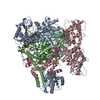


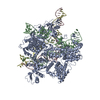
 PDBj
PDBj


